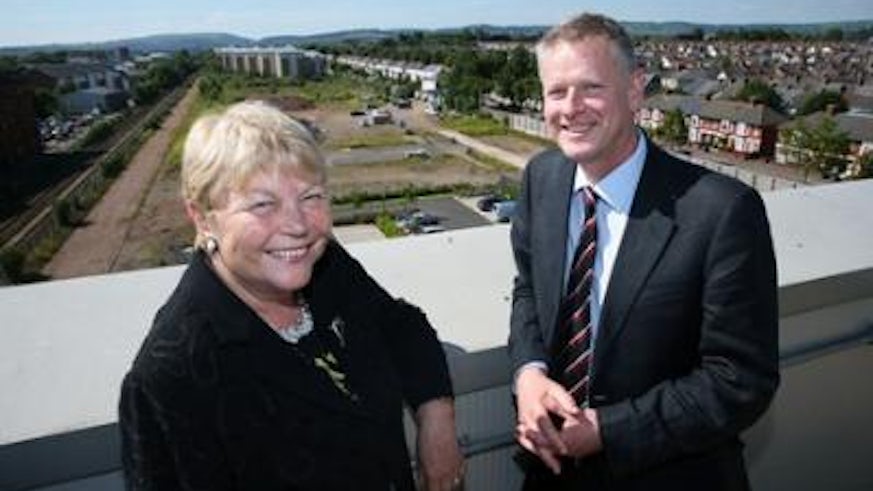Wales Office Minister visit
12 June 2014

Wales Office Minister, Baroness Randerson has today (12 June) visited Cardiff University to see first-hand how two new interdisciplinary research institutes are tackling some of the biggest health challenges facing the world's population today – cancer and mental illness.
Hosted by Professor Colin Riordan, the University's Vice-Chancellor, Baroness Randerson was touring the £30M Hadyn Ellis Building, the new flagship research facility which is home to the European Cancer Stem Cell Institute, the only institute in Europe solely dedicated to research into cancer stem cells, and the Neuroscience and Mental Health Research Institute, an interdisciplinary centre taking new discoveries and translating them into greater understanding and diagnosis of mental illness and disease.
During the visit, Baroness Randerson met with Director of the European Cancer Stem Cell Institute, Professor Alan Clarke who explained the mounting evidence that stem cells play a key role in the creation and growth of tumours, and the way they spread around the body and that if this is correct, it may be possible to treat cancer more effectively by concentrating on the stem cells alone, rather than all the cells in the tumour, as current treatments do.
Professor Clarke also set out how one of the aims of the Institute is to improve treatments for cancer patients by creating more 'personalised medicine' or 'targeted therapies'. He explained the latest development in this area which has seen Dr Richard Clarkson and his team develop a novel compound known to reverse the spread of malignant breast cancer cells by identifying a previously unknown critical role for a potential cancer causing gene, Bcl3, in metastatic breast cancer.
"We showed that suppressing this gene reduced the spread of cancer by more than 80 per cent," said Dr Richard Clarkson.
"Our next goal was to then find a way to suppress Bcl3 pharmacologically. Despite great improvements in therapy of early stage breast cancer, the current therapeutic options for patients with late stage metastatic disease are limited.
"There is therefore a clear unmet clinical need to identify new drugs to reverse or at least to slow down disease progression" he added.
Dr Clarkson, Senior lecturer in the School of Biosciences joined up with researchers Dr Andrea Brancale and Dr Andrew Westwell from the School of Pharmacy and Pharmaceutical Sciences, to develop small chemical inhibitors of the Bcl3 gene.
With financial backing from Tiziana Pharmaceuticals, work is now underway to progress the compound to clinical trials. The aim is to develop a therapeutic agent capable of blocking metastatic disease in breast cancer and a variety of tumour types.
Of the visit, Professor Colin Riordan, Vice-Chancellor said:
"The new Hadyn Ellis Building marks a new and important chapter for the University, and we were pleased to welcome Baroness Randerson here to see how we are leading the way in tackling some of the growing health challenges facing society.
"The building plays host to some of the most advanced facilities and, for the first time, brings some of our best scientists together under one roof.
"It's not only a clear indicator of our research ambition to become one of the world's top 100 Universities but also signals the gateway to the University's ambitious plans for the redevelopment of the whole of the Maindy Road site."

Wales Office Minister Baroness Jenny Randerson said:
"I was pleased to have had the opportunity to see first-hand some of the ground-breaking research being undertaken within this impressive building.
"With cancer and mental illness affecting so many people, the work being undertaken here is a demonstration of how drawing together unique areas of knowledge and expertise can do so much to strengthen the ongoing fight against some of the world's most challenging health issues.
"This facility will no doubt be a catalyst for future research projects and will bolster Cardiff University's global reputation as a leading educator and research institution."